高中英语必修一(人教版)Unit 4 Section II 课后演练 素养达标
人教版新教材高中英语必修一练测 4 UNIT 2 Section Ⅳ 知能演练轻松闯关
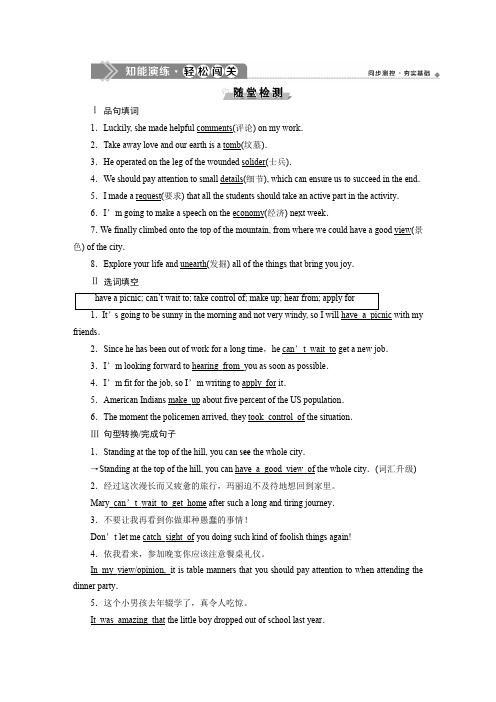
Ⅰ品句填词1.Luckily, she made helpful comments(评论) on my work.2.Take away love and our earth is a tomb(坟墓).3.He operated on the leg of the wounded solider(士兵).4.We should pay attention to small details(细节), which can ensure us to succeed in the end.5.I made a request(要求) that all the students should take an active part in the activity.6.I’m going to make a speech on the economy(经济) next week.7.We finally climbed onto the top of the mountain, from where we could have a good view(景色) of the city.8.Explore your life and unearth(发掘) all of the things that bring you joy.Ⅱ选词填空s going to be sunny in the morning and not very windy, so I will have_a_picnic with my friends.2.Since he has been out of work for a long time,he can’t_wait_to get a new job.3.I’m looking forward to hearing_from_you as soon as possible.4.I’m fit for the job, so I’m writing to apply_for it.5.American Indians make_up about five percent of the US population.6.The moment the policemen arrived, they took_control_of the situation.Ⅲ句型转换/完成句子1.Standing at the top of the hill, you can see the whole city.→Standing at the top of the hill, you can have_a_good_view_of the whole city.(词汇升级) 2.经过这次漫长而又疲惫的旅行,玛丽迫不及待地想回到家里。
高中英语必修一(人教版)Unit 3 Section Ⅱ 课后演练 素养达标
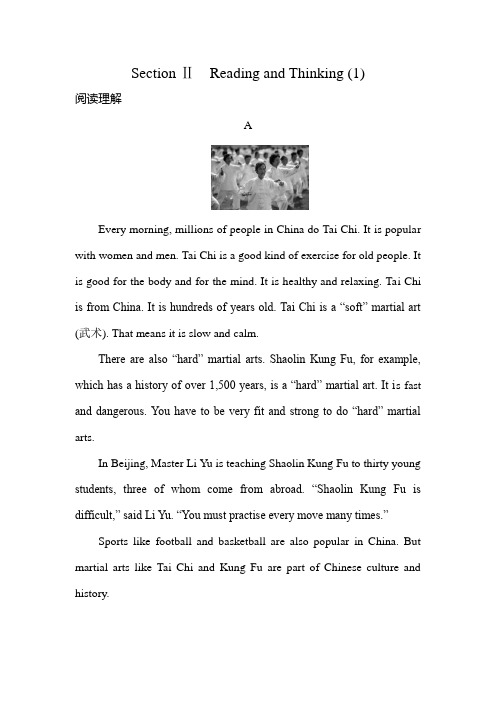
Section ⅡReading and Thinking (1)阅读理解AEvery morning, millions of people in China do Tai Chi. It is popular with women and men. Tai Chi is a good kind of exercise for old people. It is good for the body and for the mind. It is healthy and relaxing. Tai Chi is from China. It is hundreds of years old. Tai Chi is a “soft” martial art (武术). That means it is slow and calm.There are also “hard” martial arts. Shaolin Kung Fu, for example, which has a history of over 1,500 years, is a “hard” martial art. It i s fast and dangerous. You have to be very fit and strong to do “hard” martial arts.In Beijing, Master Li Yu is teaching Shaolin Kung Fu to thirty young students, three of whom come from abroad. “Shaolin Kung Fu is difficult,” said Li Yu. “You must practise every move many times.”Sports like football and basketball are also popular in China. But martial arts like Tai Chi and Kung Fu are part of Chinese culture and history.1. How many types of martial arts does this passage tell us?A. Only one.B. Two.C. Three.D. Four.解析:细节理解题。
(原创)新人教版高中英语必修一Unit4Natural Disasters 课时练习(二)(附答案)
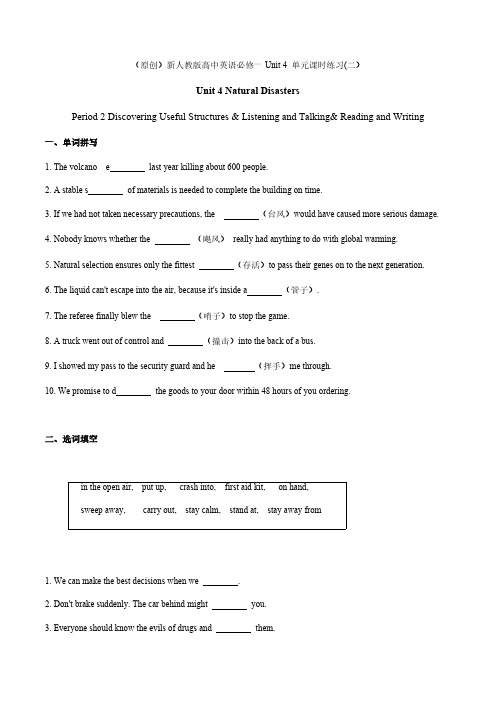
(原创)新人教版高中英语必修一Unit 4 单元课时练习(二)Unit 4 Natural DisastersPeriod 2 Discovering Useful Structures & Listening and Talking& Reading and Writing一、单词拼写1. The volcano e last year killing about 600 people.2. A stable s of materials is needed to complete the building on time.3. If we had not taken necessary precautions, the (台风)would have caused more serious damage.4. Nobody knows whether the (飓风)really had anything to do with global warming.5. Natural selection ensures only the fittest (存活)to pass their genes on to the next generation.6. The liquid can't escape into the air, because it's inside a (管子).7. The referee finally blew the (哨子)to stop the game.8. A truck went out of control and (撞击)into the back of a bus.9. I showed my pass to the security guard and he (挥手)me through.10. We promise to d the goods to your door within 48 hours of you ordering.二、选词填空in the open air, put up, crash into, first aid kit, on hand,sweep away, carry out, stay calm, stand at, stay away from1. We can make the best decisions when we .2. Don't brake suddenly. The car behind might you.3. Everyone should know the evils of drugs and them.4. We sleep out under the stars, and eat our meals .5. There are experts to give you all the help and advice you need.6. More often than not, it is easier to make a plan than to a plan.7. It is said that the number of the deaths caused by the flood 300.8. In China, people believe fire can bad luck, so, red means good luck.9. Make sure you keep a well-stocked ready to deal with any emergency.10. Many tents were to provide shelters for the homeless in the disaster-hit area.三、单句语法填空1. The project looks at how we could be more (effect)in encouraging students to enter teacher training.2. The more (power)the car the more difficult it is to handle.3. He succeeded the aid of a completely new method he discovered.4. summary, it is my opinion that the whole process of treatment was very successful.5. The president (deliver)a speech on how to effectively solve the immigration problem next week.6. Our English teacher suggests (read)English aloud every morning.7. I was taking am online class in my study I heard a loud noise in the backyard.8. She is the only one of the students won the international award.四、阅读理解Brief Intervention Finds Evidence of Nature’s Impact on HappinessNew research holds the belief that spending time outdoors can contribute to happiness.In fact, if people simply take time to notice the nature around them, it will increase their general happiness and well-being, said Holli-Anne Passmore, a Ph.D. psychology student at the University of British Columbia’s Okanagan campus.Her study, published in the Journal of Positive Psychology, examined the connection between taking a moment to look at something from the natural environment and personal well-being. The study involved a two-week experiment where participants were asked to record how nature they came across in their daily routine made them feel. They took a photo of an item that caught their attention and take down about their feelings in response to it. Other participants tracked their reactions to human-made objects, took a photo and write down theirfeelings, while a nother group did neither.Examples of nature could be anything not human built: A house plant, a dandelion(蒲公英)growing in a crack in a sidewalk, birds, or sun through a window. “This wasn’t about spending hours outdoors or going for long walks in the wilderness,” Passmore says. “This is about the tree at a bus stop in the middle of a city and the positive effect that one tree can have on people.”Passmore reports she was “overwhelmed” not only by the response of her 395 study participants, who submitted more than 2,500 photos and descriptions of emotions, but also by the impact that simply noticing emotional responses to nearby nature had on personal well-being. It also had an impact on their prosocial orientation(亲社会倾向), which is a willingness to share resources and the value they placed on community, she discovered.“The difference in participants’ well-being — their happiness, sense of elevation, and their level of connectedness to other people, not just nature — was significantly higher than participants in the group noticing how human-built objects made them feel and the control group,” she said.1. Which of the following objects may have the strongest positive effect on human well-beings?A. pictures of flowers on the wall.B. Wild animals shown in the video.C. A wild flower in a street corner.D. large bunch of artificial flowers in the office.2. How many group of people were asked to participate in the study?A. twoB. threeC. fourD. five3. According to the passage, who is the most suitable for volunteer work?A. People who often noticing the nature.B. People who always do the housework.C. People who often notice human-made objects.D. People who love doing exercise in the park.4. Where is the passage probably taken from?A. A news report.B. A science fiction.C. A medical report.D. A n entertainment magazine.Unit 4 Natural DisastersPeriod 2 答案一、单词拼写1. erupted2. supply3. typhoon4. hurricane5. survive6. pipe7. whistle8. crashed9. waved 10. deliver二、选词填空1. stay calm2. crash into3. stay away from4. in the open air5. on hand7. carry out 7. stands at 8. sweep away 9. first aid kit 10. put up三、单句语法填空1. effective2. powerful3. with4. In5. will deliver6. reading7. when8. who四、阅读理解【文章大意】本文是一篇说明文。
英语人教版必修一unit4教案+课文讲解+同步验收+跟踪练习-人教课标版1
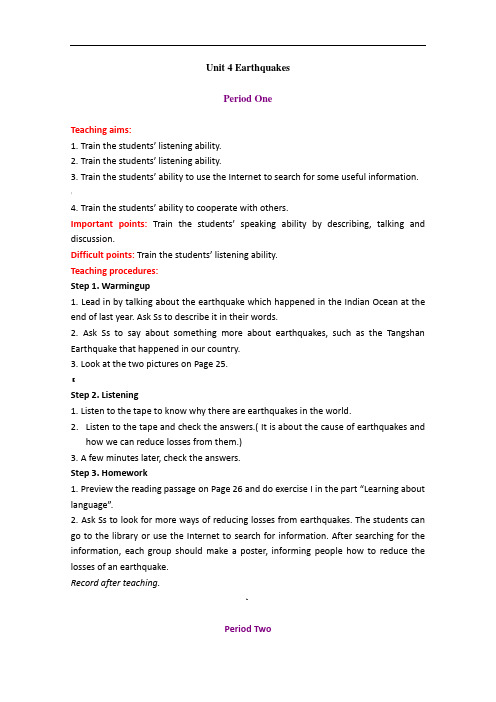
Unit 4 EarthquakesPeriod OneTeaching aims:1. Train the students’ listening ability.2. T rain the students’ listening ability.3. Train the students’ ability to use the Internet to search for some useful information. ;4. Train the students’ ability to cooperate with others.Important points:Train the students’ speaking ability by describing, talking and discussion.Difficult points: Train the students’ listening ability.Teaching procedures:Step 1. Warmingup1. Lead in by talking about the earthquake which happened in the Indian Ocean at the end of last year. Ask Ss to describe it in their words.2. Ask Ss to say about something more about earthquakes, such as the Tangshan Earthquake that happened in our country.3. Look at the two pictures on Page 25.【Step 2. Listening1. Listen to the tape to know why there are earthquakes in the world.2.Listen to the tape and check the answers.( It is about the cause of earthquakes andhow we can reduce losses from them.)3. A few minutes later, check the answers.Step 3. Homework1. Preview the reading passage on Page 26 and do exercise I in the part “Learning about language”.2. Ask Ss to look for more ways of reducing losses from earthquakes. The students can go to the library or use the Internet to search for information. After searching for the information, each group should make a poster, informing people how to reduce the losses of an earthquake.Record after teaching.、Period TwoTeaching aims:1. Learn some detailed information about an earthquake.2. I mprove the students’ reading ability.3. T rain the students’ ability to grasp key information while listening.4. T rain the students’ speaking ability."Important points:1. The new words and expressions.2. Learn some detailed information about an earthquake.3. Train the students’ ability to cooperate with others.4. Train the students’ speaking ability.Difficult points:1. Words: shake, burst, rise, destroy, shock, fresh, injure2. Phrases: right away, at an end、3. Sentence patterns:(1) It seemed/ seems that…(2) The number of sb./sth. Reached/reaches…(3)All hope was not lost.4. Improve the students’ reading ability.5. Train the students’ ability to grasp key information while listeningTeaching procedures:Step 1. Prereading】1. Ask Ss to pretend they are warned of a coming earthquake. They have time to take only one thing. Tell their partners wha t they will take and the reason.2. If an earthquake is around the corner, there must be some abnormal phenomena. Carefully look at the four pictures on Page 25 and try to describe what have been seen. Step 2. ListeningAn earthquake is very terrible. In this unit, we will learn something about the strongest earthquake in China’s history, which happened in Tangshan, Hebei, in 1976. First listen to the tape with your textbooks closed and check whether the following statements are true or false. If it is false, try to correct it.1. People in Tangshan were warned of the earthquake and didn’t go to bed that night.(F)2. People in Beijing also felt the earthquake. (T)3. More than 400 000 people were killed in the quake. (F)4. Many rescue workers and doctors were trapped under the ruins during the aftershock. (T){5. People tried to get fresh water from under the ground in Tangshan. (F)Step 3. Reading1. Finish Part 12 in Comprehending on Page 27.2. Finish Part 3 in Comprehending on Page 27.3. Read the passage again to get important information about Tangshan Earthquake and fill in the blanks.Step 4. Homework1. Read the text several times.2. Do exercise 3 on Page 28.;3. Do exercise 2 on Page 28 in the exercise book and hang it in tomorrow.4. Learn some words and phrases in this unit and make some sentences with them. ( Ss’ Book, Page 8284)Period ThreeTeaching aims:1. Train the students’ ability to read different numbers in English.2. Learn the usage of some difficult words and expressions.…3. Train the students’ ability to remove the difficulties while reading.Important points:1. Train the students’ ability to read different numbers in English.2. Train the students’ ability to cooperate with others.Difficult points:1. The explanation of some difficult words and expressions.2. Train the students’ ability to remove the difficultie s while reading.Teaching procedures:!Step 1. Revision1. Ask Ss some questions based on the Reading passage.(1) What did people in Tangshan see in the sky before the earthquake(2) What did people notice in the wells(3) Did people pay any attention to these abnormal phenomena(4) When did the earthquake begin(5) Were there any aftershocks(6) Did the survivors deny the city and go to live in other places?2. Check the homework (Ex2 on P28). Ask them to recite it after class.Step 2. Learning about NumbersTurn to Page 28 and look at Part 3. Match each word to the number that has the same meaning. Allow the students several minutes to finish the task. Check the answers. Step 3. Important pointsAsk the students to turn to Page 82. Ask some students to make some sentences with the words or phrases. Deal with some difficulties. You can add more phrases.Step 4. HomeworkIn order to master the usage of these words and expressions, please do some related exercises.1. Finish off the two parts in Using Words and Expressions on Page 63.)2. Translate the sentences on Page 63 into English. Write the English sentences in one of your exercise book and hand it in tomorrow.Period FourTeaching aims:1. Learn to choose the correct Relative Pronouns for the Attributive Clauses.2. Train the students’ ability to report what others have said.Important points:}1. Learn the Attributive Clause.2. Train the students’ ability to report what others have said.Difficult points:Learn to choose the correct Relative Pronouns for the Attributive Clauses.Teaching procedures:Step 1. RevisionCheck the homework exercises.Step 2. Grammar\W rites the sentence “Workers built shelters for survivors whose homes had beendestroyed.” On the blackboa rd before class begins. Ask Ss to think what kind of clause it isAnd then introduce The Attributive Clause to students.. The woman who lives next door is a teacher.A sentence with an attributive clause contains two shorter sentences. In the sentence a bove, the two short sentences are: “The woman is a teacher.” And “The woman lives next door.” The Attributive Clause is the answer to the question: Which woman is a teacherWould you try to divide the sample sentence on the blackboard into two short sentencesSum up the rules:“Who” is used for people. “Which” is used for things. “That” is used for things or people. “Whose” is used instead of his/her/their/somebody’s. “Whom” is quite formal, and in most cases it is all right to use who instead. But when whom has a preposition before it, it cannot be replaced by who.Step 3. Practice1. Now look at Part 2 in Discovering Useful Structures on Page 28. try to complete each sentence using that, which, who, or whose.¥Let the students do this exercise and check the answers.2. Do more exercises in Ex 3 on Page51 in《导》.Step 4. HomeworkAfter class, read the passage on Page 64. It’s about advice on how to protect your home from an earthquake. Complete the sentences below, using who, whom, which, that or whose.Period FiveTeaching aims:…1. Train the students’ speaking ability.2. Train the students’ ability to search for doing something.3. Train the students’ ability to do things step by step.Important points:1. Train the students’ speaking abilit y.2. Train the students’ ability to search for doing something.Difficult points:1. Know how to write a speech.@2. Know how to write a newspaper story.3. Learn to cooperate to each other.Teaching procedures:Step 1. RevisionCheck homework exercises and ask some students to read the sentences out.Step 2. Reading and writingRead the letter on Page 29. In the blank at the beginning of the letter, write the last number of the year it is now. Then in the blank near the end of the letter, use a number to say how many years ago the quake happened.(After several minutes, the teacher checks the answers with the class.)~T: Suppose you are the student who was invited to give the speech. What should you include in your speech(Students give their different answers.)T: Yes, while writing, don’t forget to contain the information. Now I will give you 15 minutes to write the speech. You can follow the points in part 3 on this page.(While the students are writing, the teacher gets around the classroom and helps the students to deal with any difficulties that they have.)(After 15 minutes)T: Are there any volunteers to read his or her speech( If there is nobody, the teacher asks one to read, and give some assessments.)Step 3. Speaking"T: Imagine that after your speech, Zhangsha asks you to give a short talk about the new stamps about Tangshan to honor the city. First, ask and answer the following questions in pairs.(1) What do these stamps show(2) Do you think these stamps are very important and why(3) Will you collect these stamps Why and why not(After the students ask and answer these questions in pairs.)T: Now try to fill in the lines in the little talk. You can use some of the answers to the questions.T: Next I will ask one of you to read the little talk.Step 4. Writing/T: By now you have learned writing a speech and a little talk. Now you are going towrite an article for a newspaper about a special event that happed in your hometown. First, let’s learn some skills of wr iting newspaper stories. Before you write, you should write an outline. This is very useful. Today, we will learn how to write an outline. Please turn to Page 31. Read the instructions in bold and pay attention to some questions I prepared to you.Q1: Why is an outline importantQ2: What should an outline includeQ3: Why is a headline importantQ4: What are the steps to finish a newspaper storyQ5: What is the feature of a newspaper storySuggested answers:1. Because an outline will prepare you to write a better story.·2. A good outline should have a headline, a list of main ideas and a list of important details.3. A headline can tell the readers what the topic is, so it can attract the readers’ attention since the reader may not have bought the newspaper before they read the headline.4. First, organize the main ideas. Next, put some details into each paragraph.5. A newspaper story gives the most important news first and the least important news last.T: Now let’s read the example of a newsp aper story. Try to find the headline, main idea and details of each paragraph. You may work in groups of three.(After several minutes, the teacher asks the students the following questions :)Q1: What is the headline of the newspaper storyQ2: What is the main idea@Q3: What is the detailed informationT: Now turn to Page 32 and check your main ideals and detailed information.Step 5. HomeworkT: So now you know how to write a passage step by step. Prepare the outline for a short newspaper story for China Daily. Use the example to help you to organize your outline. You can first have a discussion with your partner and decide which event you will write about. Try to write down the title, main ideas and detailed information. Then put them into a short passage.Record after teaching:______________________________________________________________________________________________________________________________________________ _______________________________________________________________________ _______________________________________________________________________ _______________________________________________________________________ _______________________________________________________________________ _______________________________________________________________________ _______________________________________________________________________ _____________________________________________________…Period SixKnowledge:Learn a passage about the San Francisco EarthquakeAbility:1. Learn to compare two similar passages.2. Train the students’ listening ability.Emotion:。
高中英语(新人教版)选择性必修一课后习题:第四单元测评(课后习题)【含答案及解析】
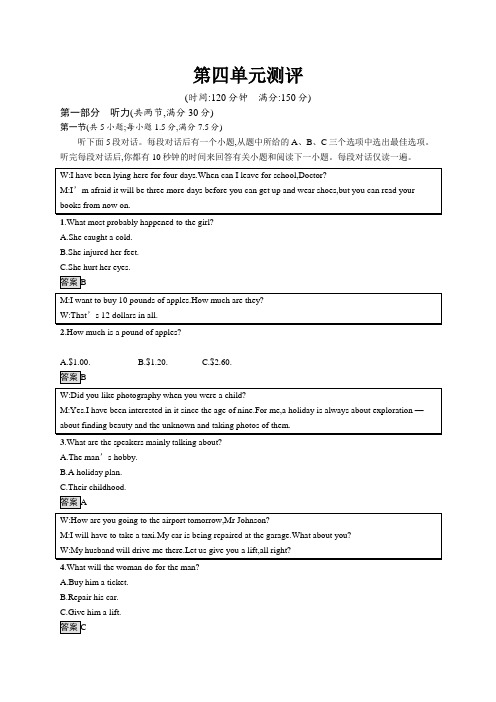
第四单元测评(时间:120分钟满分:150分)第一部分听力(共两节,满分30分)第一节(共5小题;每小题1.5分,满分7.5分)听下面5段对话。
每段对话后有一个小题,从题中所给的A、B、C三个选项中选出最佳选项。
听完每段对话后,你都有10秒钟的时间来回答有关小题和阅读下一小题。
每段对话仅读一遍。
1.What most probably happened to the girl?A.She caught a cold.B.She injured her feet.C.She hurt her eyes.2.How much is a pound of apples?A.$1.00.B.$1.20.C.$2.60.3.What are the speakers mainly talking about?A.The man’s hobby.B.A holiday plan.C.Their childhood.4.What will the woman do for the man?A.Buy him a ticket.B.Repair his car.C.Give him a lift..What interests the man better?A.Writing novels.B.Reading poems.C.Surfing the Internet.第二节(共15 小题;每小题1.5分,满分22.5分)听下面5段对话或独白。
每段对话或独白后有几个小题,从题中所给的A、B、C三个选项中选出最佳选项。
听每段对话或独白前,你将有时间阅读各个小题,每小题5秒钟;听完后,各小题将给出5秒钟的作答时间。
每段对话或独白读两遍。
听第6段材料,回答第6、7题。
6.When does the conversation probably take place?A.In the morning.B.In the afternoon.C.In the evening.7.Who will pay the bill?A.The woman.B.The man.C.Both of them.听第7段材料,回答第8至10题。
英语人教版必修一unit4教案+课文讲解+同步验收+跟踪练习-人教课标版

英语人教版必修一u n i t4教案+课文讲解+同步验收+跟踪练习-人教课标版1(总12页)--本页仅作为文档封面,使用时请直接删除即可----内页可以根据需求调整合适字体及大小--Unit 4 EarthquakesPeriod OneTeaching aims:1. Train the students’ listening ability.2. T rain the students’ listening ability.3. Train the students’ ability to use the Internet to search for some us eful information.4. Train the students’ ability to cooperate with others.Important points:Train the students’ speaking ability by describing, talking and discussion.Difficult points: Train the students’ listening ability.Teaching procedures:Step 1. Warmingup1. Lead in by talking about the earthquake which happened in the Indian Ocean at the end of last year. Ask Ss to describe it in their words.2. Ask Ss to say about something more about earthquakes, such as the Tangshan Earthquake that happened in our country.3. Look at the two pictures on Page 25.Step 2. Listening1. Listen to the tape to know why there are earthquakes in the world.2.Listen to the tape and check the answers.( It is about the cause of earthquakesand how we can reduce losses from them.)3. A few minutes later, check the answers.Step 3. Homework1. Preview the reading passage on Page 26 and do exercise I in the part “Learning about language”.2. Ask Ss to look for more ways of reducing losses from earthquakes. The students can go to the library or use the Internet to search for information. After searching for the information, each group should make a poster, informing people how to reduce the losses of an earthquake.Record after teaching.Period TwoTeaching aims:1. Learn some detailed information about an earthquake.2. I mprove the students’ reading ability.3. T rain the students’ ability to grasp key information while listening.4. T rain the students’ speaking ability.Important points:1. The new words and expressions.2. Learn some detailed information about an earthquake.3. Train the students’ ability to cooperate with others.4. Train the students’ speaking ability.Difficult points:1. Words: shake, burst, rise, destroy, shock, fresh, injure2. Phrases: right away, at an end3. Sentence patterns:(1) It seemed/ seems that…(2) The number of sb./sth. Reached/reaches…(3)All hope was not lost.4. Improve the students’ reading ability.5. Train the students’ ability to grasp key information whi le listeningTeaching procedures:Step 1. Prereading1. Ask Ss to pretend they are warned of a coming earthquake. They have time to take only one thing. Tell their partners wha t they will take and the reason.2. If an earthquake is around the corner, there must be some abnormal phenomena. Carefully look at the four pictures on Page 25 and try to describe what have been seen.Step 2. ListeningAn earthquake is very terrible. In this unit, we will learn something about the strongest earthquake in China’s history, which happened in Tangshan, Hebei, in 1976. First listen to the tape with your textbooks closed and check whether the following statements are true or false. If it is false, try to correct it.1. People in Tangshan were warned of the earthquake and didn’t go to bed that night. (F)2. People in Beijing also felt the earthquake. (T)3. More than 400 000 people were killed in the quake. (F)4. Many rescue workers and doctors were trapped under the ruins during the aftershock. (T)5. People tried to get fresh water from under the ground in Tangshan. (F)Step 3. Reading1. Finish Part 12 in Comprehending on Page 27.2. Finish Part 3 in Comprehending on Page 27.3. Read the passage again to get important information about Tangshan Earthquake and fill in the blanks.Step 4. Homework1. Read the text several times.2. Do exercise 3 on Page 28.3. Do exercise 2 on Page 28 in the exercise book and hang it in tomorrow.4. Learn some words and phrases in this unit and make some sentences with them. ( Ss’ Book, Page 8284)Period ThreeTeaching aims:1. Train the students’ ability to read different numbers in English.2. Learn the usage of some difficult words and expressions.3. Train the students’ ability to remove the difficulties while read ing.Important points:1. Train the students’ ability to read different numbers in English.2. Train the students’ ability to cooperate with others.Difficult points:1. The explanation of some difficult words and expressions.2. Train the students’ ability to remove the difficulties while reading.Teaching procedures:Step 1. Revision1. Ask Ss some questions based on the Reading passage.(1) What did people in Tangshan see in the sky before the earthquake(2) What did people notice in the wells(3) Did people pay any attention to these abnormal phenomena(4) When did the earthquake begin(5) Were there any aftershocks(6) Did the survivors deny the city and go to live in other places2. Check the homework (Ex2 on P28). Ask them to recite it after class.Step 2. Learning about NumbersTurn to Page 28 and look at Part 3. Match each word to the number that has the same meaning. Allow the students several minutes to finish the task. Check the answers.Step 3. Important pointsAsk the students to turn to Page 82. Ask some students to make some sentences with the words or phrases. Deal with some difficulties. You can add more phrases. Step 4. HomeworkIn order to master the usage of these words and expressions, please do some related exercises.1. Finish off the two parts in Using Words and Expressions on Page 63.2. Translate the sentences on Page 63 into English. Write the English sentences in one of your exercise book and hand it in tomorrow.Period FourTeaching aims:1. Learn to choose the correct Relative Pronouns for the Attributive Clauses.2. Train the students’ ability to report what others have said.Important points:1. Learn the Attributive Clause.2. Train the students’ ability to report what others have said.Difficult points:Learn to choose the correct Relative Pronouns for the Attributive Clauses. Teaching procedures:Step 1. RevisionCheck the homework exercises.Step 2. GrammarW rites the sentence “Workers built shelters for survivors whose homes had been dest royed.” On the blackboard before c lass begins. Ask Ss to think what kind of clause it isAnd then introduce The Attributive Clause to students.. The woman who lives next door is a teacher.A sentence with an attributive clause contains two shorter sentences. In the sentence above, the two short sentences are: “The woman is a teacher.” And “The woman lives next door.” The Attributive Clause is the answer to the question: Which woman is a teacherWould you try to divide the sample sentence on the blackboard into two short sentencesSum up the rules:“Who” is used for people. “Which” is used for things. “That” is used for things or people. “Whose” is used instead of his/her/their/somebody’s. “Whom” is quite formal, and in most cases it is all right to use who instead. But when whom has a preposition before it, it cannot be replaced by who.Step 3. Practice1. Now look at Part 2 in Discovering Useful Structures on Page 28. try to complete each sentence using that, which, who, or whose.Let the students do this exercise and check the answers.2. Do more exercises in Ex 3 on Page51 in《导》.Step 4. HomeworkAfter class, read the passage on Page 64. It’s about advice on how to protect your home from an earthquake. Complete the sentences below, using who, whom, which, that or whose.Period FiveTeaching aims:1. Train the students’ speaking ability.2. Train the students’ ability to search for doing something.3. Train the students’ ability to do things step by step.Important points:1. Train the studen ts’ speaking ability.2. Train the students’ ability to search for doing something.Difficult points:1. Know how to write a speech.2. Know how to write a newspaper story.3. Learn to cooperate to each other.Teaching procedures:Step 1. RevisionCheck homework exercises and ask some students to read the sentences out. Step 2. Reading and writingRead the letter on Page 29. In the blank at the beginning of the letter, write the last number of the year it is now. Then in the blank near the end of the letter, use a number to say how many years ago the quake happened.(After several minutes, the teacher checks the answers with the class.)T: Suppose you are the student who was invited to give the speech. What should you include in your speech(Students give their different answers.)T: Yes, while writing, don’t forget to contain the information. Now I will give you 15 minutes to write the speech. You can follow the points in part 3 on this page. (While the students are writing, the teacher gets around the classroom and helps the students to deal with any difficulties that they have.)(After 15 minutes)T: Are there any volunteers to read his or her speech( If there is nobody, the teacher asks one to read, and give some assessments.) Step 3. SpeakingT: Imagine that after your speech, Zhangsha asks you to give a short talk about the new stamps about Tangshan to honor the city. First, ask and answer the following questions in pairs.(1) What do these stamps show(2) Do you think these stamps are very important and why(3) Will you collect these stamps Why and why not(After the students ask and answer these questions in pairs.)T: Now try to fill in the lines in the little talk. You can use some of the answers to the questions.T: Next I will ask one of you to read the little talk.Step 4. WritingT: By now you have learned writing a speech and a little talk. Now you are going to write an article for a newspaper about a special event that happed in your hometown. First, let’s learn some s kills of writing newspaper stories. Before you write, you should write an outline. This is very useful. Today, we will learn how to write an outline. Please turn to Page 31. Read the instructions in bold and pay attention to some questions I prepared to you.Q1: Why is an outline importantQ2: What should an outline includeQ3: Why is a headline importantQ4: What are the steps to finish a newspaper storyQ5: What is the feature of a newspaper storySuggested answers:1. Because an outline will prepare you to write a better story.2. A good outline should have a headline, a list of main ideas and a list of important details.3. A headline can tell the readers what the topic is, so it can attract the readers’ attention since the reader may not have bought the newspaper before they read the headline.4. First, organize the main ideas. Next, put some details into each paragraph.5. A newspaper story gives the most important news first and the least important news last.T: Now let’s read the example o f a newspaper story. Try to find the headline, main idea and details of each paragraph. You may work in groups of three.(After several minutes, the teacher asks the students the following questions :)Q1: What is the headline of the newspaper storyQ2: What is the main ideaQ3: What is the detailed informationT: Now turn to Page 32 and check your main ideals and detailed information. Step 5. HomeworkT: So now you know how to write a passage step by step. Prepare the outline for a short newspaper story for China Daily. Use the example to help you to organize your outline. You can first have a discussion with your partner and decide which event you will write about. Try to write down the title, main ideas and detailed information. Then put them into a short passage.Record after teaching:_____________________________________________________________________________________ _____________________________________________________________________________________ _____________________________________________________________________________________ _____________________________________________________________________________________ __________________________________________________________________________________________________________________________________________________________________________ _____________________________________________________________________________________ __________________________Period SixKnowledge:Learn a passage about the San Francisco EarthquakeAbility:1. Learn to compare two similar passages.2. Train the students’ listening ability.Emotion:1. Learn to cooperate with others.2. Learn from the bravery of the people of San Francisco to face the reality. Teaching Important Points:1. Train the students’ listening ability.2. Learn a passage about the San Francisco EarthquakeTeaching Difficulties:Learn to compare two similar passages.Teaching Procedures:Step 1. RevisionT: In the second period of this unit, you learnt some detailed information about the Tangshan Eearthquake. Can you use several sentences to summarize the passageS: Let me have a try. The terrible earthquake struck the city of Tangshan while people were sleeping. More than 400 000 people were killed or injured in the quake. After the quake, people found nearly everything was destroyed. But people in Tangshan didn’t lose heart. They rebuilt the city with the help of soldiers.T: Quite good.Step 2. Reading and ComparingT: In the first period, we also talked about the earthquakes that happened in San Francisco. Today, we will learn a passage titled “The Story of an Eyewitness”, which is about the San Francisco Earthquake in 1906. It was written by Jake London, who was a famous American writer.T: First read the passage carefully. While reading, please think about the following questions:(1) How did the author feel about the earthquake(2) How did the author feel about the people of San Francisco(Ss read the passage, then the teacher asks someone to give their answers and checks the answers)(Answers will vary.)T: Quite good. You can keep your own answers as long as you think they are reasonable and you can find proofs from the passage.Read the first paragraph in this passage .Then go back and read again the first paragraph of the passage on Page 26. Compare the ways both writers give you details about the earthquakes. Try to finish the 4 exercises on Page 66. You may discuss in group of three.(Ss read the two passage and finish the exercises.)(Then the teacher checks the answers.)T: Next I will play the tape of this passage for you to listen. Please pay special attention to the intonation.(After listening.)T: Now I will give you several minutes to read the third paragraph with feelings. Step 3. ListeningT: Just now we learned a passage written by an eyewitness about the terrible San Francisco earthquake in 1906. Now we will listen to a story told by a man who was a survivor of the earthquake. Listen to the tape the first time, and try to tell whether the statements in part 1 are true or false.(Teacher plays the tape for the students to listen and finish the task.)(After listening, the teacher checks the answers with the class.)T: Now let’s listen to the tape again and try to answer the questions in Part 2. (After listening, the teacher checks the answers)T: While listening to the tape, you should not only pay attention to the contents, but also the pronunciation and intonation. The sentences in Part 3 show us thesequence. I will play the tape again, you should mark liaison and incomplete explosion in these sentences. Then practice reading them aloud.Step 4. HomeworkT: In this class we read and listened to two stories ,both of which are about the 1906 San Francisco earthquake. The stories are true and were written for the Museum of the City of San Francisco. The museum has many such personal accounts and photos at If you are interested in them, you can surf in the site I’ve given to you.Record after teaching:_____________________________________________________________________________________ _____________________________________________________________________________________ _____________________________________________________________________________________ _____________________________________________________________________________________ _____________________________________________________________________________________ _____________________________________________________________________________________ _____________________________________________________________________________________ __________________________Period SevenKnowledge:1. Learn how to make an earthquake plan.2. Learn what to contain in a personal earthquake bag.Ability:1. Train the students’ listening ability.2. Train the stu dents’ speaking ability.3. Learn to find reasons for their choices.4. Learn to sum up what they have learned in the unit.Emotion:Learn to cooperate with others.Teaching Important Points:1. Train the students’ listening ability.2. Train the st udents’ speaking ability.Teaching Difficulties:Learn to find reasons for their choices.Teaching Procedures:Step 1. GreetingsGreet the whole class as usual.Step 2. ListeningT: These days Earthquakes are always our central topic. We have learned many things about it. Up till now, earthquakes are difficult to predict. We can hardly avoid an earthquake. But actually we can do things to reduce the losses of an earthquake. Let’s look at the form on Page 66 and have a discussion about the earthquake plan with your partner.( Ss give their answers)T: What should you do if you are outside(Ss give their answers)T: What should you do if you are in the living room(different answers)T: What should you do if you are in the house room(different answers)T: Next we are going to listen to the tape and write down the three “things” that are mentioned.(After listening, teacher checks the answers with the students.)T: Then let’s listen again. This time you should write down more details about each of the “things”.(After listening, teacher checks the answers with the class. Play the tape again if necessary.)Step 3. SpeakingT: You know every family should have an earthquake bag, in which there are enough things that you can use in case of an earthquake. Here we have a list of possible items for the personal earthquake bag. Choose only eight things, which you think are the most essential, from the list. They must last you five days. Discuss with your partner.(After several minutes.)T: Now join another pair and discuss your choices. Put all the things you agree on into a final list. Discuss the other items explaining your reasons and trying to agree which ones are the most suitable.(After several minutes.)T: Each group should choose one representative. Now be prepared to present your list to the class and give your reasons for each choice.Step 4. Learning TipT: In order to learn a language well, you should do a lot of practice, including listening, speaking, reading and writing. Only when we understand what is said to us can we have a conversation with somebody. So listening to English is very important. After class, you should listen to the English news on CCTV International. You will not only get a lot of information about what is happening around the world, but also improve your listening and learn more English words and expressions. At the same, you will improve your pronunciation and intonation. Step 5. Summing upT: Now let’s sum up what you have learnt in this unit. Work with your partner. First write down what you have learned about earthquakes. Then write down the verbs, nouns, expressions and new grammar items that you have learned from this unit. Step 6. Homework1. Review Unit 4. .2. Preview Unit 5.Record after teaching:_____________________________________________________________________________________ _____________________________________________________________________________________ _____________________________________________________________________________________ _____________________________________________________________________________________ _____________________________________________________________________________________ _____________________________________________________________________________________ _____________________________________________________________________________________ __________________________The End2121。
人教版高中英语必修第一册UNIT4 Section Ⅱ 练习含答案

SectionⅡReading and Thinking课后·训练提升一、根据句意及首字母提示写出单词.The farmers were sad to see that their crops were r by the storm..When we b,the air goes into our lungs..When I came in,she was still b in reading a novel..They use wind energy to produce e..In my class,40 p of the students go to school by bus now..He was badly hurt in the game and s great pain.’s a good idea to know the historical c of the events..He is an old man of great w.in 1945.a big earthquake,the city took on a new look.the noise comes from upstairs.4.The firefighters went into the building on fire to rescue those whoa hollow in the soft ground.,I’m sure you can make it.7.The young scientist a lot when he went to the desert to do,but he’ll get over it after a rest.9.Natural disasters may leave cities .reading books.Search and rescue teams are often accompanied by man’s best friend.A dog’s greater sense of smell can be important to find survivors buried under fallen buildings.But now a new animal is being trained to assist search and rescue teams after an earthquake hits,and it’s the rat.These rescue rats are being trained by Dr Donna Kean,a researcher from Glasgow,Scotland who has been working with rats for years.Kean explained why she and her colleagues at the non-profit APOPO trained rats instead of dogs.“The rats have a comparable sense of smell,and they’re just as trainable as dogs,”she said.“Their size is useful because they will be able to move through different environments that dogs just wouldn’t be able to.”At the moment,the rats are wearing home-made prototype backpacks that contain microphones,video equipment,and location trackers,and then scientists are sending these rats into mock debris(模拟的废墟).Rats would be able to get into small spaces to get to victims buried in the ruins.“We have not been in a real situation yet;we have got a mock debris site.When we track the backpack,we will be able to hear from where the rat is inside the debris,”Kean said.“We have the potential to speak to victims through the rat.”Researchers train them on a basic series of behaviour.Training starts off in a really basic environment:a small and empty room.Then they gradually increase the difficulty in order to make it like real life.They can start adding in debris and making the training area look more like an actual collapsed(坍塌的) building site.The training just started,and researchers still have to run training trials outside the research environment.They are working with a search and rescue group called GEA,who are based inTürkiye,a country with frequent earthquakes and hoping that by next year they’ll be able to take the rats to Türkiye for trials.1.What advantage do rats have over dogs in the rescue work?A.They are easier to train.B.They have a better sense of smell.C.They are more suitable with a smaller size.“Their size is useful because they will be able to move through different environments that dogs just wouldn’t be able to.”可知,在救援工作中,相比于狗来说,老鼠的优势在于它们体型更小,更灵活。
高中英语(必修一)教师用书:Unit 4 Section Ⅱ Warming Up 26 Reading—Language Points Word版含答案

Section ⅡWarming Up & Reading —Language Pointsburst vi.爆裂;爆发n.突然破裂;爆发(教材P26)In the city,the water pipes in some buildings cracked and burst.在市内,有些建筑物里的水管爆裂开来。
(1)⎩⎪⎨⎪⎧burst out crying/laughing burst into tears/laughter 突然哭起来/笑起来burst with anger/joy 勃然大怒/乐不可支(2)burst in/into闯进;突然破门而入①She burst into tears when she learned her failure in the exam.她一听说自己考试不及格就失声大哭。
②The class burst out laughing(laugh).全班突然大笑起来。
③I felt as if my heart would burst with joy.我觉得自己高兴得心花怒放。
爆裂突然(大笑……)冲,闯进,突然出现at an end结束;终结(教材P26)It seemed as if the world was at an end!仿佛到了世界末日!(1)at the end of在……末端 by the end of到……为止(用于完成时) in the end最后;终于 (2) ⎭⎬⎫bring sth.to an end put an end to (使)结束;终结come to an end结束①Only two teams go down in the Chinese Super League at the end of this season. 本赛季末在中超只有两支队伍降级。
②All reports must be sent in by the end of this week.所有的报告必须在本星期以前交齐。
2022-2023学年高中英语人教版(2019)必修第一册Unit4 单元课后作业- (2)
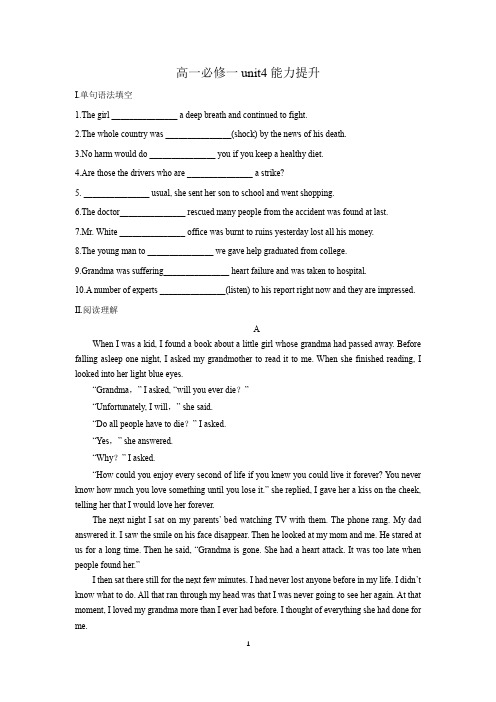
高一必修一unit4能力提升I.单句语法填空1.The girl _______________ a deep breath and continued to fight.2.The whole country was _______________(shock) by the news of his death.3.No harm would do _______________ you if you keep a healthy diet.4.Are those the drivers who are _______________ a strike?5. _______________ usual, she sent her son to school and went shopping.6.The doctor_______________ rescued many people from the accident was found at last.7.Mr. White _______________ office was burnt to ruins yesterday lost all his money.8.The young man to _______________ we gave help graduated from college.9.Grandma was suffering_______________ heart failure and was taken to hospital.10.A number of experts _______________(listen) to his report right now and they are impressed. II.阅读理解AWhen I was a kid, I found a book about a little girl whose grandma had passed away. Before falling asleep one night, I asked my grandmother to read it to me. When she finished reading, I looked into her light blue eyes.“Grandma,” I asked, “will you ever die?”“Unfortunately, I will,” she said.“Do all people have to die?” I asked.“Yes,” she answered.“Why?” I asked.“How could you enjoy every second of life if you knew you could live it forever? You never know how much you love something until you lose it.” she replied, I gave her a kiss on the cheek, telling her that I would love her forever.The next night I sat on my parents’ bed watching TV with them. The phone rang. My dad answered it. I saw the smile on his face disappear. Then he looked at my mom and me. He stared at us for a long time. Then he said, “Grandma is gone. She had a heart attack. It was too late when people found her.”I then sat there still for the next few minutes. I had never lost anyone before in my life. I didn’t know what to do. All that ran through my head was that I was never going to see her again. At that moment, I loved my grandma more than I ever had before. I thought of everything she had done for me.Life changes though we don’t expect it to. I never knew I would remember forever what my grandma said that night. Of course I am upset when people die, but missing them makes me love them more every second. No one can live forever, so we should try to live every second to the fullest.1. When the writer asked why everyone would die, her grandmother tried to make her understand that _____.A. nobody wants to live foreverB. people will work harder if they know they will dieC. only those who live for a short time will succeedD. knowing we will die makes us enjoy life more2. The news that the writer’s father received over the phone was that the writer’s grandma_____.A. was missingB. was dyingC. had diedD. had an accident3. When hearing the sad news, what did the writer do?A. She didn’t move for a few minutes.B. She ran to her grandma’s home at once.C. She cried out at once.D. She asked her father what exactly happened.4. By writing this passage, the writer wants us to _____.A. know that everyone will dieB. spend every minute with those we loveC. try our best to help those we loveD. live every second to the fullest5. Which of the following can be used as the best title of the passage?A. Why People DieB. What Grandma Taught MeC. Grandma’s Life StoryD. Death Is TerribleBNo two cultures are the same. The American and Indian cultures have very vast differences between them. While the culture of America is a mixture of different cultures, the Indian culture is unique and has its own values.One of the major differences that can be seen between American and Indian cultures is in family relations. While the Indians are very much family oriented(以…为导向), the Americans are individual oriented. In Indian culture, the family values are more important than the individual values. Indians respect family values. On the other hand, in American culture the individual values get more importance than the family values.In another sense, it can be said that the American culture is more goal oriented and the Indian culture is more people or family oriented. Indians may even forsake their individual wishes and also happiness for families. But in American culture, this cannot be seen.Unlike the Indians, the Americans plan things ahead. The Americans believe in dominating(统治) nature and controlling the environment around them. On the contrary, Indians believe in the harmony with nature. Another difference that can be seen between Indian culture and American culture is that the Indians love stability(稳定)while the Americans love mobility(变化).In American culture, one can see that individuals think of self-reliance. On the other hand, Indians are more dependent on others. While the children in the US are brought up to live an independent life, the children in India are not brought up in that way. In Indian culture, there is respect for the elders and it is they who make decisions. But in American culture, each individual makes his own decisions.Coming to competition, Indians are more competitive than the Americans. Coming to work nature, the Indians work for meeting the family needs. On the contrary, an American will only work hard to rise on his own. Another difference that can be seen is that Americans have great regard for time and its value while Indians are different.6. From Paragraph 2, we know that compared to Americans, Indians _____.A. pay more attention to themselvesB. don’t value so many things in their lifeC. give less importance to their cultureD. are more devoted to their families7. What does the underlined word “forsake” in Paragraph 3 mean?A. expose toB. show offC. give upD. take up8. What is right about children in India according to the passage?A. They often struggle to become independent.B. They are usually not encouraged to make decisions.C. They usually don’t show much respect for the elderly.D. They are taught to depend on themselves from an early age.9. This passage is mainly developed by _____.A. making comparisonsB. giving examplesC. explaining causesD. describing a process10. The passage is mainly about_____.A. why Americans don’t love their familiesB. What Indians would do when they are kidsC. the differences between Americans and IndiansD. the benefits of living in AmericaIII.完形填空We are often warned by our teacher not to waste precious time, because time 11 will never return. I think it quite true. What does time look like? Nobody knows for we can’t see it or 12 it and no amount of money can 13 it.Time passes very quickly. Some students say they don’t have 14 time to review all their lessons. It is because they don’t know how to make 15 of their time. They waste it in going to theatres, cinemas and parks, and doing 16 things. Why should we 17 time? The 18 very simple. We wish to save time because time is valuable.Today we are living in the 21st century. We look upon time as 19 .When a person dies, his life 20 . Since life is short, we must 21 our time and energy to our study so that we may be able to 22 the people well in the future. Laziness is the thief of time, for it does not only bring us failure but also 23 us other harm. If it is necessary for us to do our work today, let us do it today and not 24 it until tomorrow.Remember that time is much more 25 than money.11. A. expected B. found C. lost D. made12. A. get B. have C. see D. touch13. A. find B. sense C. buy D. realize14. A. little B. enough C. valuable D. useful15. A. use B. light C. up D. fun16. A. another B. other C. some D. any17. A. challenge B. save C. waste D. lack18. A. question B. problem C. answer D. method19. A. money B. life C. gold D. water20.A. ends B. begins C. comes to D. lives21. A. waste B. value C. put D. devote22. A. ask B. remember C. save D. serve23. A. brings B. takes C. does D. sends24. A. stay B. forget C. remain D. leave25. A. valuable B. expensive C. positive D unusualIV.书面表达假如你所在学校为了进一步增强学生的安全意识,提高自我保护能力,开展了以安全为主题的英语演讲比赛。
高中英语必修一(人教版)Unit 4 Section V 单元评定 素养达标
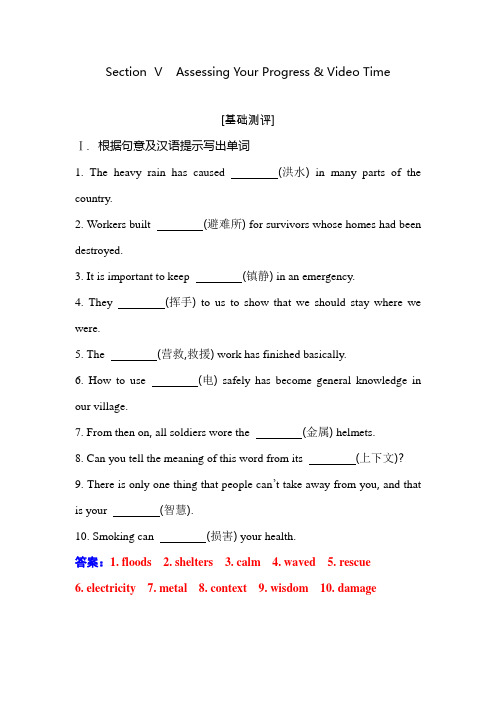
Section ⅤAssessing Your Progress & Video Time[基础测评]Ⅰ.根据句意及汉语提示写出单词1. The heavy rain has caused (洪水)in many parts of the country.2. Workers built (避难所) for survivors whose homes had been destroyed.3. It is important to keep (镇静) in an emergency.4. They (挥手)to us to show that we should stay where we were.5. The (营救,救援) work has finished basically.6. How to use (电)safely has become general knowledge in our village.7. From then on, all soldiers wore the (金属) helmets.8. Can you tell the meaning of this word from its (上下文)?9. There is only one thing that people can’t take away from you, and that is your (智慧).10. Smoking can (损害) your health.答案:1. floods 2. shelters 3. calm 4. waved 5. rescue6. electricity7. metal8. context9. wisdom 10. damageⅡ.单句语法填空1. The old man took a deep (breathe), and began to climb the stairs.2. I was (shock) by the way he treated his mother.3. His father had wished to (bury) in the sea after he died.4. He (strike) the poor dog, which had ever done him serious harm.5. Do you think what will happen when food and petrol(supply) run out?6. We all know that some of those earthquakes cause (power) tsunamis.7. We shall remember the sacrifices of the (death)during the big fire.8. I am glad to say the new rules will become (effect)in the next few days.9. Surprisingly, a letter (deliver) to me without any stamps on it.10. A (survive) of a very unpleasant experience is a person who has had such an experience, and who is still affected by it.答案:1. breath 2. shocked 3. be buried 4. struck 5. supplies 6. powerful7. dead8. effective 9. was delivered10. survivorⅢ.完成句子1. 这个会议太烦人了!看起来好像要没完没了的开下去。
新教材高中英语Unit4SectionⅡ课时作业新人教版必修第一册(含答案)
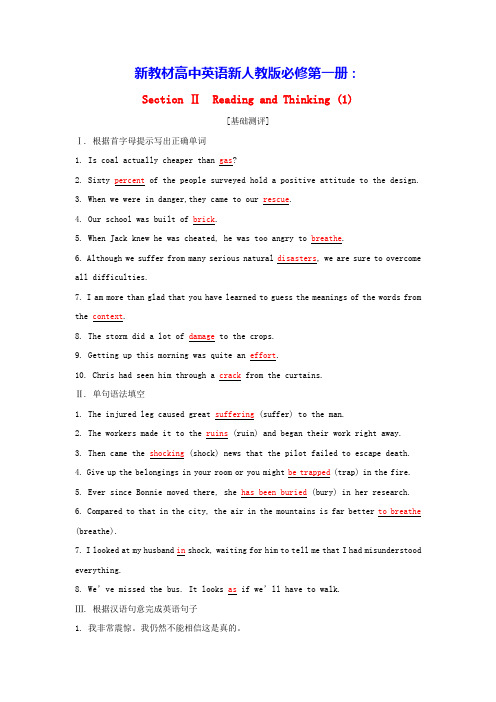
新教材高中英语新人教版必修第一册:Section ⅡReading and Thinking (1)[基础测评]Ⅰ. 根据首字母提示写出正确单词1. Is coal actually cheaper than gas?2. Sixty percent of the people surveyed hold a positive attitude to the design.3. When we were in danger,they came to our rescue.4. Our school was built of brick.5. When Jack knew he was cheated, he was too angry to breathe.6. Although we suffer from many serious natural disasters, we are sure to overcome all difficulties.7. I am more than glad that you have learned to guess the meanings of the words from the context.8. The storm did a lot of damage to the crops.9. Getting up this morning was quite an effort.10. Chris had seen him through a crack from the curtains.Ⅱ. 单句语法填空1. The injured leg caused great suffering (suffer) to the man.2. The workers made it to the ruins (ruin) and began their work right away.3. Then came the shocking (shock) news that the pilot failed to escape death.4. Give up the belongings in your room or you might be trapped(trap) in the fire.5. Ever since Bonnie moved there, she has been buried (bury) in her research.6. Compared to that in the city, the air in the mountains is far better to breathe (breathe).7. I looked at my husband in shock, waiting for him to tell me that I had misunderstood everything.8. We’ve missed the bus. It looks as if we’ll have to walk.Ⅲ. 根据汉语句意完成英语句子1. 我非常震惊。
人教版高中英语必修一Unit4单元测试后附答案

人教版高中英语必修一Unit4单元测试含答案重点单词短语考核和能力提升一、单句语法填空(本大题共3小题,共6.0分)1.The bridge has been under_________(construct) for about two years, but it is still unclear when it can be completed.2.He was punished for_________(打扰) other when they were working.3.We all depend on our parents for food, _________(衣物) and shelter.二、阅读理解(本大题共8小题,共16.0分)AOn October 12, 1989, some British scientists were working at the computers to look for the information they needed. Suddenly they saw a lot of very bright points crossing the computer screens. At the same time the computers were working much slower. To find out what was happening they stopped their work to check some parts of the computers. To their horror,they found out that most of their stored information was got rid of by computer viruses(病毒)!Clearly all these computers had been infected by computer viruses.It is said that the computer viruses were made by a group of young men fond of playing tricks. They all had excellent education. They created the viruses just to show their intelligence. These kinds of computer viruses are named Jerusalem Viruses. These viruses can stay in computers for a long time. When the time comes they will attack(袭击)the computers by lowering the functions, damaging their normal programs or even getting rid of all the information.We now come to know that Jerusalem Viruses often attack computers on Friday and that they are spreading(传播)to a lot of computers. Among the countries that were attacked by computer viruses last year are Britain, Australia, Switzerland and the U.S. But till now, how to get rid of the terrible viruses remains a problem.4.When the viruses attack the computers, the computers will work .A. normallyB. slowlyC. fasterD. well5.The group of young men created the viruses to .A. damage the computersB. test their abilityC. tell people that they were intelligentD. play a trick on users of the computers6.According to the passage, computer viruses seem to .A. have been in nature for yearsB. stay in any computersC. be difficult to get rid of at presentD. be able to be got rid of in the near future7.According to the passage, which of the following is TRUE?A. Last year six countries found their computers were infected by viruses.B. The viruses will come to a new computer after staying in the old one for some time.C. Scientists are trying to find a way to get rid of the viruses.D. The Jerusalem Viruses are dangerous to human health.BTim Richter and his wife, Linda, had taught for over 30 years near Buffalo, New York—he in computers, she in special education.“Teaching means everything to us,” Tim would say. In April 1998, he learned he would need a heart operation. It was the kind of news that leads to some serious thinking about life's purpose.Not long after the surgery, Tim saw a brochure describing Imagination Library, a program started by Dolly Parton's foundation (基金会) that mailed a book every month to children from birth to age five in the singer's home town of Sevier, Tennessee. “I thought, maybe Linda and I could do something like this when we retire,”Tim recalls. He placed the brochure on his desk,“as a reminder.”Five years later, now retired and with that brochure still on the desk, Tim clicked on imagination library .com. The program had been opened up to partners who could take advantage of book and postage discounts.The quality of the books was of great concern to the Richters. Rather than sign up online, they went to Dollywood for a look-see. “We didn't want to give the children rubbish,” says Linda. The books reviewed each year by teachers, literacy specialists and Dollywood board members included classics such as Ezra Jack Keats's The Snowy Day and newer books like Anna Dewdney's Llama Llama series.Satisfied, the couple set up the Richter Family Foundation and got to work. Since 2004, they have shipped more than 12,200 books to preschoolers in their area. Megan Williams, a mother of four, is more than appreciative: “This program introduces us to books I've never heard of .”The Richters spend about $ 400 a month sending books to 200 children. “Some people sit there and wait to die,” says Tim. “Others get as busy as they can in the time they have left.”8.What let Tim think seriously about the meaning of life?A. His health problem.B. His love for teaching.C. The influence of his wife.D. The news from the Web.9.What did Tim want to do after learning about Imagination Library?A. Give out brochures.B. Do something similar.C. Write books for children.D. Retire from being a teacher.10.According to the text,Dolly Parton is________.A. a well-known surgeonB. a mother of a four-year-oldC. a singer born in TennesseeD. a computer programmer11.Why did the Richters go to Dollywood?A. To avoid signing up online.B. To meet Dollywood board members.C. To make sure the books were the newest.D. To see if the books were of good quality.15.【答案】【小题1】B 【小题2】C 【小题3】C 【小题4】C【解析】【文章大意】1989年10月12日,一些英国科学家在计算机上工作,寻找他们需要的信息。
高中英语新人教版)选择性必修一课后习题:Unit 4 Section B(课后习题)【含答案及解析】
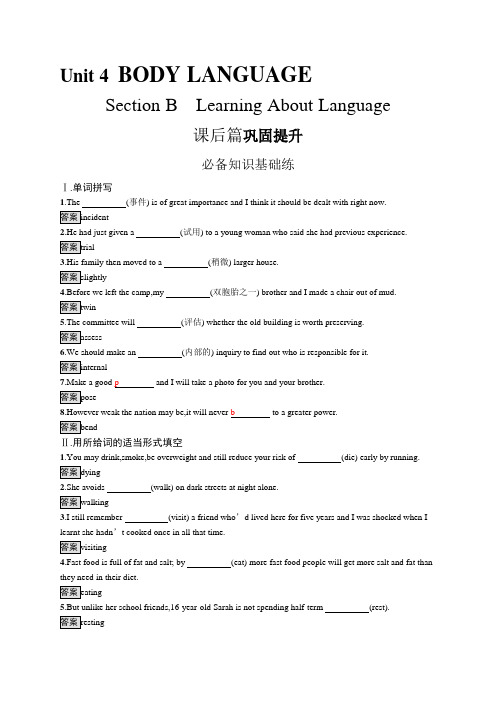
Unit4 BODY LANGUAGESection B Learning About Language课后篇巩固提升必备知识基础练Ⅰ.单词拼写1.The (事件) is of great importance and I think it should be dealt with right now.2.He had just given a (试用) to a young woman who said she had previous experience.3.His family then moved to a (稍微) larger house.4.Before we left the camp,my (双胞胎之一) brother and I made a chair out of mud.5.The committee will (评估) whether the old building is worth preserving.6.We should make an (内部的) inquiry to find out who is responsible for it.7.Make a good p and I will take a photo for you and your brother.8.However weak the nation may be,it will never b to a greater power.Ⅱ.用所给词的适当形式填空1.You may drink,smoke,be overweight and still reduce your risk of (die) early by running.2.She avoids (walk) on dark streets at night alone.3.I still remember (visit) a friend who’d lived here for five years and I was shocked when I learnt she hadn’t cooked once in all that time.4.Fast food is full of fat and salt; by (eat) more fast food people will get more salt and fat than they need in their diet.5.But unlike her school friends,16-year-old Sarah is not spending half-term (rest).6.The manager told me that my task was (clean) the floors of the building.7.The news is quite (shock).8.My grandpa said last summer they earned quite a lot by (sell) the fish.9.We can choose between staying at home and (take) a trip.10.Once your business becomes international,(fly) constantly will be part of your life.Ⅲ.完成句子1.I am sorry to (与……不同) you on that question.2.On average,seventy percent of the students in each class are (赞同) the proposal.3.I (赞成) your trying to make money,but please don’t neglect your studies.4.If you don’t know what you want,you might (最终) not getting something you want.5.And (收拾整齐) in here before you leave,will you?6.(与……相比) Susan’s English,yours is better,so you should be confident about yourself.关键能力提升练Ⅳ.阅读理解主题语境:人与自我做人与做事(2020新高考全国Ⅰ卷)Jennifer Mauer has needed more willpower than the typical college student to pursue her goal of earning a nursing degree.That willpower bore fruit when Jennifer graduated from University of Wisconsin-Eau Claire and became the first in her large family to earn a bachelor’s degree.Mauer,of Edgar,Wisconsin,grew up on a farm in a family of 10 children.Her dad worked at a job away from the farm,and her mother ran the farm with the kids.After high school,Jennifer attended a local technical college,working to pay her tuition(学费),because there was no extra money set aside for a college education.After graduation,she worked to help her sisters and brothers pay for their schooling.Jennifer now is married and has three children of her own.She decided to go back to college to advance her career and to be able to better support her family while doing something she loves:nursing.She chose the UW-Eau Claire program at Ministry Saint Joseph’s Hospital in Marshfield because she was able to pursue her four-year degree close to home.She could drive to class and be home in the evening to help with her kids.Jennifer received great support from her family as she worked to earn her degree:Her husband worked two jobs to cover the bills,and her 68-year-old mother helped take care of the children at times.Through it all,she remained in good academic standing and graduated with honors.Jennifer sacrificed(牺牲) to achieve her goal,giving up many nights with her kids and missing important events to study.“Some nights my heart was breaking to have to pick between my kids and studying for exams or papers,”she says.However,her children have learned an important lesson witnessing their mother earn her degree.Jennifer is a first-generation graduate and an inspiration to her family—and that’s pretty powerful.【语篇解读】本文是一篇记叙文。
高中英语新人教版)选择性必修一课后习题:Unit 4 Section C(课后习题)【含答案及解析】

Unit4 BODY LANGUAGESection C Using Language课后篇巩固提升必备知识基础练Ⅰ.单句语法填空1.Do you know how human beings got the idea of using (gesture) to communicate?2.A few words will be enough (clarify) things.3.It (reveal) that a growing number of people are overweight.4.The woman was worried because she was not confident her silent acting ability.5.Sometimes things are not said (direct),so we must guess the meaning.6.About 80% of you understand the conversation is read through the body.Ⅱ.短语填空1.Many citizens in Beijing got back their stolen bicycles last year.2.They asked him to leave—,he was fired by the boss.3.We found the way to this math problem by discussing it.4.Be prepared to the meanings and have your partner guess what you mean.5.It doesn’t to buy the cheapest brand of computer just to save a few dollars.6.They will be concerned to do the right thing—to dress properly,.Ⅲ.完成句子1.因此,他们不能集中精力学习,容易在课堂上犯困。
高中英语人教版必修第一册第四单元课后练习
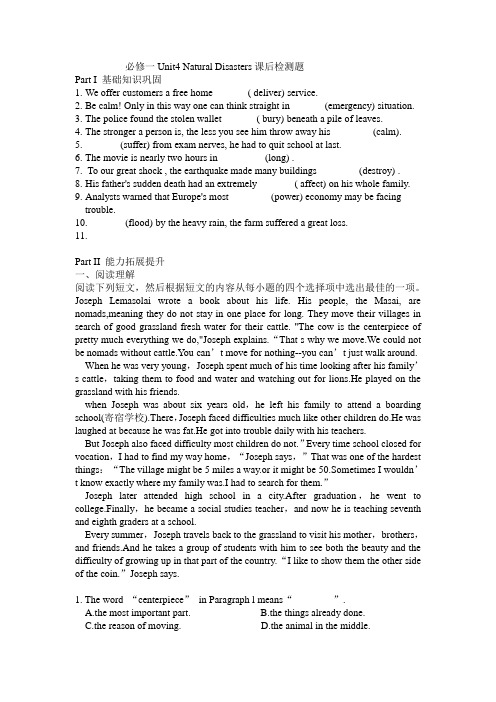
必修一Unit4 Natural Disasters课后检测题Part I 基础知识巩固1.We offer customers a free home_______( deliver) service.2.Be calm! Only in this way one can think straight in_______(emergency) situation.3.The police found the stolen wallet_______( bury) beneath a pile of leaves.4.The stronger a person is, the less you see him throw away his ________(calm).5._______(suffer) from exam nerves, he had to quit school at last.6.The movie is nearly two hours in _________(long) .7. To our great shock , the earthquake made many buildings ________(destroy) .8.His father's sudden death had an extremely _______( affect) on his whole family.9.Analysts warned that Europe's most ________(power) economy may be facing trouble.10._______(flood) by the heavy rain, the farm suffered a great loss.11.Part II能力拓展提升一、阅读理解阅读下列短文,然后根据短文的内容从每小题的四个选择项中选出最佳的一项。
2020秋新教材英语人教版必修第一册演练达标:Unit 4 Natural disasters Section II
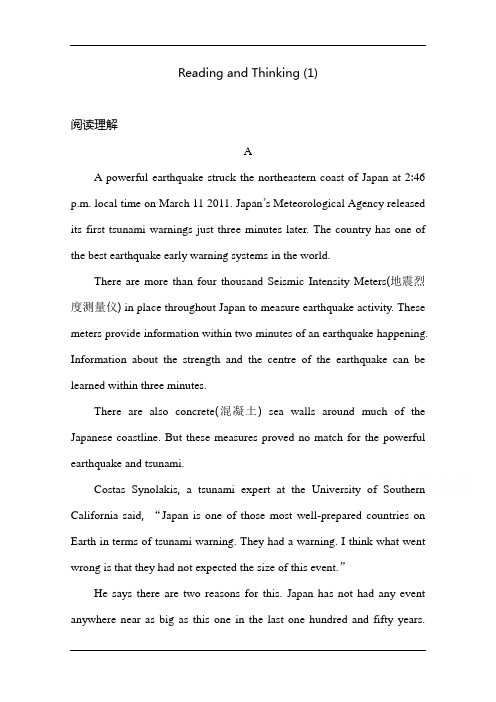
Reading and Thinking (1)阅读理解AA powerful earthquake struck the northeastern coast of Japan at 2:46 p.m. local time on March 11 2011. Japan’s Meteorological Agency released its first tsunami warnings just three minutes later. The country has one of the best earthquake early warning systems in the world.There are more than four thousand Seismic Intensity Meters(地震烈度测量仪) in place throughout Japan to measure earthquake activity. These meters provide information within two minutes of an earthquake happening. Information about the strength and the centre of the earthquake can be learned within three minutes.There are also concrete(混凝土)sea walls around much of the Japanese coastline. But these measures proved no match for the powerful earthquake and tsunami.Costas Synolakis,a tsunami expert at the University of Southern California said,“Japan is one of those most well-prepared countries on Earth in terms of tsunami warning. They had a warning. I think what went wrong is that they had not expected the size of this event.”He says there are two reasons for this. Japan has not had any event anywhere near as big as this one in the last one hundred and fifty years.And scientists had not expected such a large earthquake happening off the coast of Japan.The nine point zero magnitude earthquake was the fourth most powerful earthquake ever recorded worldwide. It was also the worst earthquake ever to hit Japan. The tsunami waves that followed were reported to have reached as high as thirteen metres in some areas.Costas Synolakis says Japan’s concrete sea walls were not built to handle such high waves.1. Where can this passage probably be adapted from?A. A newspaper.B. A fairy tale.C. A sports website.D. An entertainment magazine.解析:推理判断题。
高中英语必修一(人教版)WELCOME UNIT Section Ⅱ 课后演练 素养达标
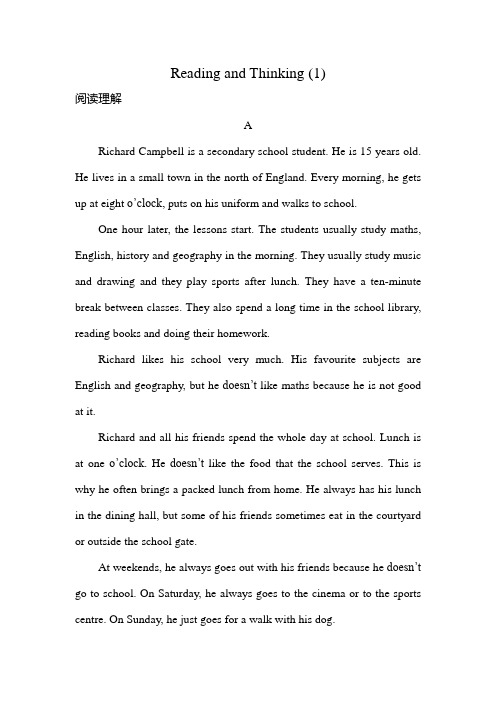
Reading and Thinking (1)阅读理解ARichard Campbell is a secondary school student. He is 15 years old. He lives in a small town in the north of England. Every morning, he gets up at eight o’clock, puts on his uniform and walks to school.One hour later, the lessons start. The students usually study maths, English, history and geography in the morning. They usually study music and drawing and they play sports after lunch. They have a ten-minute break between classes. They also spend a long time in the school library, reading books and doing their homework.Richard likes his school very much. His favourite subjects are English and geography, but he doesn’t like maths because he is not good at it.Richard and all his friends spend the whole day at school. Lunch is at one o’clock.He doesn’t like the food that the school serves. This is why he often brings a packed lunch from home. He always has his lunch in the dining hall, but some of his friends sometimes eat in the courtyard or outside the school gate.At weekends, he always goes out with his friends because he doesn’t go to school. On Saturday, he always goes to the cinema or to the sports centre. On Sunday, he just goes for a walk with his dog.1. What time do Richard’s lessons begin in the morning?A. At 8:00.B. At 8:30.C. At 9:00.D. At 9:10.解析:细节理解题。
高中英语必修一(人教版)WELCOME UNIT Section Ⅲ 课后演练 素养达标

Section ⅢDiscovering Useful Structures[基础测评]Ⅰ. 找出下面句子分别属于哪个句型a. SVb. SPc. SVOd. S V IO DOe. SVOCf. SV Ag. SVOA1. Please tell us a story.2. She smiled.3. I have a lot of work to do.4. His job is to train swimmers.5. He noticed a man enter the room.6. I will spend this summer holiday in the countryside.7. There, the air is fresh and the water is clean.8. I can hear birds singing in the green trees.9. The little girl smiled happily.10. She ordered herself a new dress.答案:1. d 2. a 3. c 4. b 5. e 6. g7. b8. e9. f10. dⅡ. 根据提示完成句子1. (这条河看上去非常美丽) in the early morning. (SP)2. I hear that (婴儿在隔壁房间哭). (SV A)3. (我通常做功课) at home in the evening. (SVOA)4. Now (农民正在教那个男孩怎样种树). (S V IO DO)5. When he came in, (他发现老人死了). (SVOC)6. (那块蛋糕尝起来很好吃) indeed. (SP)7. (过去有许多鸟) spending the winter here. (There be)答案:1. The river looks very beautiful2. a baby is crying in the next room3. I usually do my homework4. the farmer is showing the boy how to plant a tree5. he found the old man dead6. The cake tastes delicious7. There used to be a great many birdsⅢ. 根据提示,按要求补全下面的道歉信,并背诵成文Dear Mr Smith,I am writing to tell you an important change about my summer vacation schedule.The reason why I have to change my summer schedule is that ①(有一个项目,There be 句式) for a group of students to help some poor students in a remote village. ②(项目持续一个月,主+谓+状). Unfortunately,I am one of them. I hope ③(这个变化不会使你失望,主+谓+宾+宾补). Will this winter vacation be appropriate for me to carry on my American culture tour? ④(我很兴奋,主+表).When I imagine that, ⑤(我能体验不同的春节,主+谓+宾) from my hometown!Again, sorry for the schedule change and inconvenience. ⑥(我盼望你的回复,主+谓+宾) soon.Yours sincerely,Li Hua 答案:①there is a project②The project will last a month③the change won’t make you disappointed④I am excited⑤I can experience a different Spring Festival⑥I look/am looking forward to your reply[提升测评]Ⅳ. 语法填空Linda is a really hard-working student, but her grades 1.(fall) since three months ago. This is because she sometimes has trouble concentrating 2. her study. She also refuses 3. (talk) with teachers and friends. What’s worse, she feels 4. (tire) allthe time but has difficulty in falling asleep. 5. she is going through is brought to her mother’s attention. Therefore, h er mother asks her what happens to her, but she just says she feels like 6. (cry).As a matter of fact, Linda is suffering from clinical depression (临床抑郁症). It can be described as a mood 7. is so low that it affects your daily life 8. (bad). The first signs of it in teens are 9. (poor) school reports than before, learning difficulties and staying away from classmates and teachers. If you have these signs, don’t worry.10. are many effective ways, such as medicine, small talk, more exercise and a balanced diet.答案:1. have fallen 2. on 3. to talk 4. tired 5. What 6. crying 7. which8. badly9. poorer10. There。
人教版新课标高一英语必修一unit4精编练习打印版附答案

Specialized Training 1.4完形填空(2013年湖南长沙模拟)A woman came out of her house and saw three old men with long white beards sittingthink I know you,but you must be in her front yard.She did not1them.She said“Idon’t2.Pleasecome in and have something to eat.”out.”“Then w e “Is t he man of the house3?”they asked.“No”,she said.“He’scannot come in.”they replied.In the evening when her4came home,she told him what had happened.“Go t o tell them I am home and5them in!”The woman went out and invited the men in.“We d o notshe wanted to know.go into a house6,”they replied.“Why is that?”One of the old men7:“His n ame is Wealth,”he said pointing to one of his friends, and said pointing to another one,“He i s Success,and I am8.”Then he added,“Now go in and discuss with your husband which one of us you want in your home.”The woman went in and told her husband what was said.Her husband was9.“How nice!”he said.“Since t hat is the10,let us invite Wealth.Let him come and11our home with wealth!”we invite Success?”Their13was listening from His wife12.“My dear,why don’tthe other corner of the house.She jumped in with her own14:“Would it not be better to invite Love?Our home will then be filled with love!”advice,”said the husband to his wife.“16“Let us15our daughter-in-law’sand invite Love to be our17.”The woman went out and asked the three old men,“Which one of you is Love?Please come in and be our guest.”Love18and started walking towards the house.The other two also got up and followed him.19,the lady asked Wealth and Success,“Ionly invited Love.Why are you coming in?”The old men replied together,“If y ou had invited Wealth or Success,the other two of us would have20,but since you invited Love,wherever he goes,we go with him.Wherever there is Love,there is also Wealth and Success!”(377W)1.A.recognize B.realize C.notice D.believe2.A.dirty B.thirsty C.angry D.hungry3.A.strong B.brave C.home D.clever4.A.husband B.father C.neighbour D.relative5.A.invite B.force C.cheat D.encourage6.A.separately B.together C.secretly D.straight7.A.shouted B.smiled C.explained D.admitted8.A.Happiness B.Sadness C.Love D.Success9.A.upset B.overjoyed C.active D.negative10.A.reason B.result C.excuse D.case11.A.fill B.furniture C.buy D.sell12.A.disagreed B.agreed C.pleased D.moved13.A.advisor B.daughter C.daughter-in-law D.teacher14.A.child B.suggestion C.money D.man15.A.fix B.repair C.soften D.follow16.A.Go away B.Turn around C.Get in D.Go out17.A.member B.emperor C.wealth D.guest18.A.woke up B.passedaway C.got up D.sat down19.A.Horrible B.Surprised C.Alone D.Uncomfortable20.A.died out B.ran out C.cried aloud D.stayed out单词拼写1.From the time I was about four until I was about six,I___________(破坏)each of my toys.2.They were_________(震惊)by the news that ten people were killed in the accident.3.After finishing my homework,I wandered into the dining room where you were________ (埋头于)under piles of law books.4.Perhaps I have not e_________myself very well.5.My English teacher's humor was such as to make every student b_______into laughter.翻译句子1.老师好像对你做的事很满意。
- 1、下载文档前请自行甄别文档内容的完整性,平台不提供额外的编辑、内容补充、找答案等附加服务。
- 2、"仅部分预览"的文档,不可在线预览部分如存在完整性等问题,可反馈申请退款(可完整预览的文档不适用该条件!)。
- 3、如文档侵犯您的权益,请联系客服反馈,我们会尽快为您处理(人工客服工作时间:9:00-18:30)。
Reading and Thinking (1)阅读理解AA powerful earthquake struck the northeastern coast of Japan at 2:46 p.m. local time on March 11 2011. Japan’s Meteorological Agency released its first tsunami warnings just three minutes later. The country has one of the best earthquake early warning systems in the world.There are more than four thousand Seismic Intensity Meters(地震烈度测量仪)in place throughout Japan to measure earthquake activity. These meters provide information within two minutes of an earthquake happening. Information about the strength and the centre of the earthquake can be learned within three minutes.There are also concrete(混凝土)sea walls around much of the Japanese coastline. But these measures proved no match for the powerful earthquake and tsunami.Costas Synolakis,a tsunami expert at the University of Southern California said,“Japan is one of those most well-prepared countries on Earth in terms of tsunami warning. They had a warning. I think what went wrong is that they had not expected the size of this event.”He says there are two reasons for this. Japan has not had any event anywhere near as big as this one in the last one hundred and fifty years.And scientists had not expected such a large earthquake happening off the coast of Japan.The nine point zero magnitude earthquake was the fourth most powerful earthquake ever recorded worldwide. It was also the worst earthquake ever to hit Japan. The tsunami waves that followed were reported to have reached as high as thirteen metres in some areas.Costas Synolakis says Japan’s concrete sea walls were not built to handle such high waves.1. Where can this passage probably be adapted from?A. A newspaper.B. A fairy tale.C. A sports website.D. An entertainment magazine.解析:推理判断题。
本文介绍了日本由于地震所引发的海啸对日本产生的巨大破坏以及日本对于地震的预防等方面的信息,故最有可能是来自报纸。
答案:A2. Which of the following statements is NOT true?A. A terrible earthquake hit the northeastern coast of Japan.B. The powerful earthquake was also the worst one in Japan.C. The 9.0 earthquake was the fourth most powerful earthquake ever recorded in Japan.D. Japan’s concrete sea walls were unable to handle such high waves.解析:细节理解题。
根据文章倒数第二段中的“The nine point zero magnitude earthquake was the fourth most powerful earthquake ever recorded worldwide.”可知,9.0级地震是全世界范围里第四大的地震,而不是日本。
故C项说法错误。
答案:C3. Why did Japan suffer such a loss according to Costas Synolakis?A. The country has never experienced any event as big as this one over the past 150 years.B. Japan has the best earthquake early warning systems.C. There are not enough concrete sea walls around the Japanese coastline.D.The government didn’t announce its first tsunami warnings three minutes earlier.解析:细节理解题。
根据文章倒数第三段中“Japan ha s not had any event anywhere near as big as this one in the last one hundred and fifty years.”可知,破坏性如此之大是因为日本人没有预料到有如此严重的地震会袭击日本。
故A项正确。
答案:ABMandara seemed to know something big was about to happen. So she let out a yell, caught hold of her 2-year-old daughter Kibibi and climbed up into a tree. She lives at the National Zoo in Washington D.C.And on Tuesday, August 23rd, witnesses said she seemed to sense the big earthquake that shook much of the East Coast before any humans knew what was going on. And she’s not the only one. In the moments before the quake, an orangutan(猩猩) let out a loud call and then climbed to the top of her shelter.“It’s very different from their normal call,” said Brandie Smith, the zookeeper. “The lemurs(monkey-like animals of Madagascar) will sound an alarm call if they see or hear something highly unusual.”“Animals can hear above and below our range of hearing,” said Brandie Smith. “That’s part of their special abilities.”Primates weren’t the only animals that seemed to sense the quake before it happened. One of the elephants made a warning sound and a huge lizard(蜥蜴) ran quickly for cover. The flamingoes(a kind of bird) gathered before the quake and stayed together until the shaking stopped.Not all the animals behaved unusually before the quake. For example, Smith said the zoo’s giant pandas didn’t jump up until the shaking actually began. But many of the other animals seemed to know something was coming before it happened. “I’m not surprised at all,” Smith said.4. Why did Mandara act strangely one day?A. Because she sensed something unusual would happen.B. Because her daughter Kibibi was injured.C. Because she heard an orangutan let out a loud call.D. Because an earthquake had happened.解析:细节理解题。
